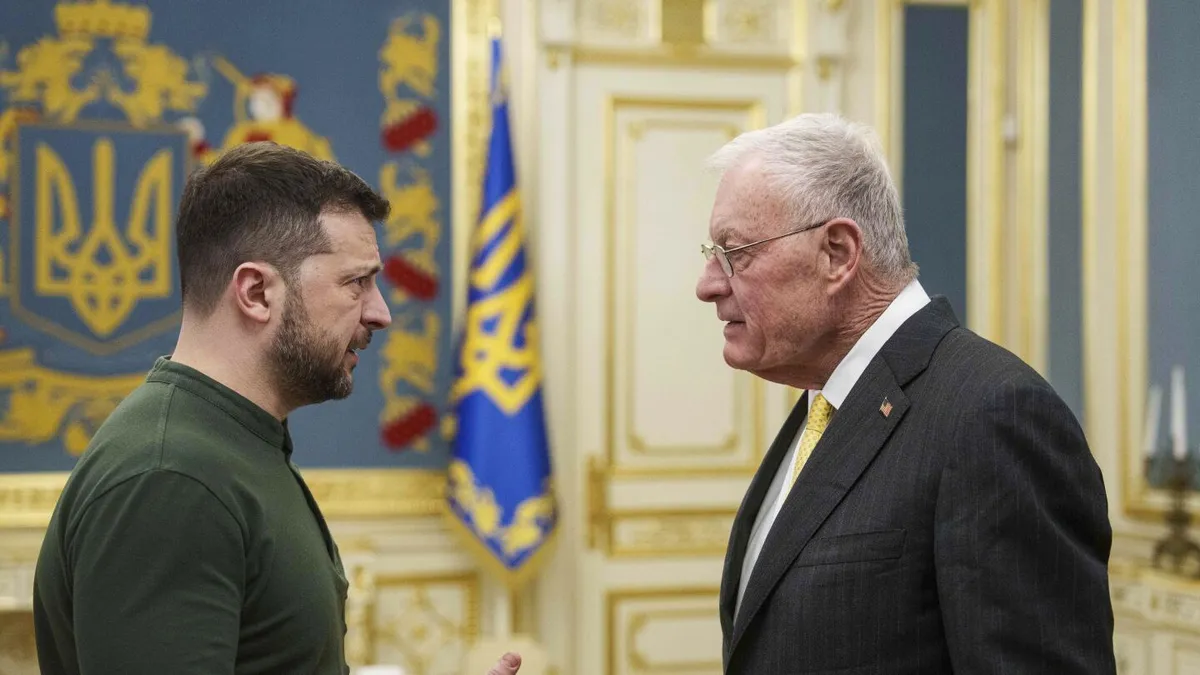
In a significant development this week, the White House issued a "fair warning" to Ukraine before President Donald Trump ordered a temporary halt on U.S. military assistance and intelligence sharing with Kyiv. This announcement was made by a senior administration official on Thursday, amidst escalating tensions following a contentious Oval Office meeting between Trump and Ukrainian President Volodymyr Zelenskyy.
The meeting between Trump and Zelenskyy reportedly devolved into a shouting match, with both Trump and Vice President JD Vance criticizing Zelenskyy for his perceived lack of gratitude toward the billions of dollars in U.S. assistance that have flowed to Ukraine since the onset of the Russian invasion three years ago. Retired Lt. Gen. Keith Kellogg, who serves as Trump’s special envoy to Ukraine and Russia, indicated that the pause in assistance is already having a significant impact on Kyiv, suggesting that the Ukrainians “brought it on themselves.”
Kellogg described the situation as akin to “hitting a mule with a two-by-four across the nose,” emphasizing that the action was meant to get Ukraine's attention. He further clarified that it was communicated to Ukrainian officials prior to last week’s meeting that discussions would center around a critical minerals deal. This agreement, which has yet to be finalized, aims to provide the U.S. with access to Ukraine’s rare earth deposits, crucial for sectors such as aerospace, electric vehicles, and medical manufacturing.
Administration officials believe that this economic pact could strengthen ties between the U.S. and Ukraine, potentially deterring Russian President Vladimir Putin from engaging in further hostile actions against Ukraine. However, Zelenskyy has been pressing the White House for explicit security guarantees, which remain unfulfilled.
The meeting took a turn when Zelenskyy urged Trump to take a firmer stance in favor of Ukraine, despite Trump's role as a potential mediator in peace talks with Russia. Following the heated exchange, Zelenskyy described the incident as “regrettable” and expressed his readiness to sign the aforementioned agreement. During a speech in Brussels on Thursday, he reiterated his gratitude for European support and mentioned that teams from both the U.S. and Ukraine had resumed discussions in hopes of having a “meaningful meeting” next week.
“Ukraine has been seeking peace since the very first second of the war, and we have always said that the only reason why the war continues is because of Russia,” Zelenskyy stated, highlighting his commitment to ending the conflict.
Another special envoy from the Trump administration, Steve Witkoff, confirmed that senior officials are working to arrange talks next week with top Ukrainian leaders in Saudi Arabia. Witkoff noted that Zelenskyy has expressed regret over the recent confrontation with the White House and conveyed his appreciation for U.S. support. However, there remains uncertainty regarding whether the minerals deal will be finalized in the upcoming meeting.
Kellogg has cautioned that even if Zelenskyy accepts the deal, he cannot guarantee a resumption of U.S. weapons deliveries, emphasizing that the ultimate decision lies with the president. He stated, “You don’t negotiate peace discussions in public. You don’t try to challenge the president of the United States in the Oval Office.”
In a speech to Congress on Tuesday, Trump revealed that Zelenskyy had reached out to express his appreciation for U.S. support in Ukraine’s ongoing conflict with Russia. Zelenskyy indicated that Ukraine is prepared to negotiate a peace deal with Russia promptly and would accept the minerals agreement with the U.S. to facilitate that process. However, Trump did not clarify whether this communication would influence his policies toward Ukraine.
The suspension of U.S. intelligence sharing with Ukraine poses serious risks, potentially hampering Ukraine’s ability to defend itself against ongoing Russian attacks on military and civilian targets. According to an assessment by the Institute for the Study of War, this halt could allow Russian forces to escalate their drone and missile strikes against Ukraine, adversely affecting millions of civilians and the growth of Ukraine’s defense industrial base.